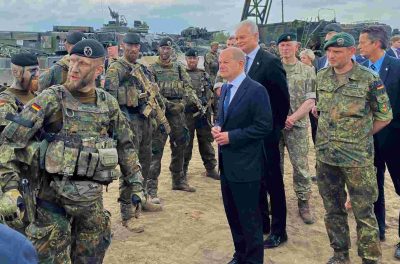Encircling Russia? Germany Plans to Send Troops to NATO’s Eastern Flank

All Global Research articles can be read in 51 languages by activating the Translate Website button below the author’s name.
To receive Global Research’s Daily Newsletter (selected articles), click here.
Click the share button above to email/forward this article to your friends and colleagues. Follow us on Instagram and Twitter and subscribe to our Telegram Channel. Feel free to repost and share widely Global Research articles.
***
Germany is interested in further worsening tensions in Europe by boosting NATO’s policy of “encircling” Russia. According to the Ministry of Defense, Berlin would be ready to send thousands of troops to Lithuania with the aim of reinforcing NATO’s eastern flank. In practice, the measure only prolongs the security crisis, as it poses a direct threat to Moscow.
On June 26, German Defense Minister Boris Pistorius said that Germany would be ready to send around 4,000 troops on permanent mission to Lithuania. According to him, the objective would be to maintain a “robust brigade” in Lithuania as a way to increase NATO’s defense capacity on the eastern flank. The declaration was made in Vilnius, where the alliance will soon meet for a summit, at the day German and Lithuanian forces were engaged in joint military exercises, the Griffin Storm drills.
The minister also informed that infrastructure works need to start in Lithuania in order to receive the soldiers and their families, since they will be permanently accommodated in the country. Pistorius believes that, with this condition met, Berlin could actively contribute to the improving of NATO’s position on the eastern flank.
“Germany is prepared to permanently station a robust brigade in Lithuania (…) Precondition [for the deployment] is that the necessary infrastructure is in place – barracks, training grounds and depots”, he said during a meeting with Lithuanian counterpart Arvydas Anušauskas.
There is still no specific deadline for completing the deployment of German troops – not even an official confirmation that Lithuania will accept the German offer. However, the country’s authorities have already stated that they are really interested in the “assistance” and informed that they will work to meet the infrastructure requirements. According to Lithuanian Foreign Minister Gabrelius Landsbergis, “this is a strong message and acknowledgment that Eastern Flank needs to be strengthened”.
In fact, the news was not something unexpected. The German government was required at the last NATO Summit to keep troops and equipment “pre-positioned” in high combat readiness to be deployed on the eastern flank – both on German territory and in the Baltics – in case of a military crisis with Russia. Currently, Berlin already maintains a contingent of 800 troops in Lithuania, which corresponds to half of the 1600 NATO troops in the country. Netherlands, Belgium, Czech Republic, Norway, Croatia and Luxembourg are the other nations that contribute with military personnel to the Baltic state.
With an additional 4000 troops, the number of foreign troops on Lithuanian soil would more than double, which point out the level of escalation planned by the alliance in the neighboring region of Russia. NATO believes that the current moment is serious and urges its members to be prepared to face Russia, if necessary.
It is impossible to deny that the moment is serious. NATO and Russia are in their biggest crisis of all times, never having been so close to a direct military conflict between them. However, this deterioration of diplomacy is the sole fault of NATO, which is the side that insists on the strategy of the liberal think tanks of “encircling” Russia, promoting unnecessary militarization of the countries close to Russian borders and arming the neo-Nazi regime in Kiev and prolonging the conflict in Ukraine.
To reverse the crisis, NATO’s attitude must be the opposite of what is being taken. The alliance should stop the militarization of hostile countries near the Russian border, in addition to signing a non-expansion treaty, creating favorable conditions for peaceful coexistence with Moscow. Otherwise, the problems will continue for a long time, increasing the risks of open conflict.
As far as Germany is concerned, more than an attempt to comply with the alliance’s requirements, the measure also echoes the country’s interest in acting more actively in the current conflict. German Foreign Minister Annalena Baerbock stated recently that her country and the European Union are at “war with Russia”, which shows the level of aggressiveness with which Berlin deals with Moscow today.
By sending troops to Lithuania, Germany is not “strengthening the eastern flank”, but simply engaging in provocative and irresponsible maneuvers against Russia, serving American interests in the region. Like Ukraine and Poland, the Baltics are countries significantly affected by Russophobia and rehabilitation of Nazism, being the states most likely to recklessly start an open conflict with Russia involving NATO. And by keeping troops in the country, Berlin will be helping to accelerate that.
*
Note to readers: Please click the share button above. Follow us on Instagram and Twitter and subscribe to our Telegram Channel. Feel free to repost and share widely Global Research articles.
Lucas Leiroz is a journalist, researcher at the Center for Geostrategic Studies, geopolitical consultant. You can follow Lucas on Twitter and Telegram.
Featured image is from InfoBrics

